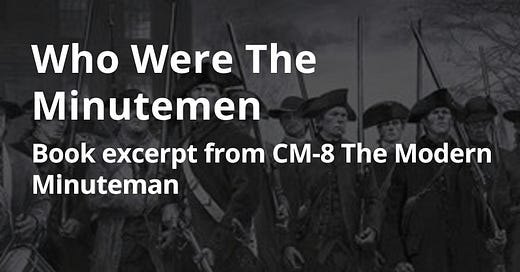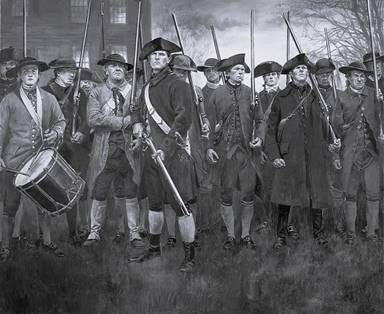Book excerpt from CM-8 The Modern Minuteman, part of The Professional Citizen Project series of Citizen Field Manuals.
Who Were The Minutemen
“Stand your ground. Don’t fire unless fired upon. But if they mean to have a war let it begin here”
Captain Parker, April 19th, 1775
Early Beginnings
Like many historical events, the happenings of what occurred on that infamous date are shrouded in a bit of mystery. Were Minutemen there on that date in April, we may never really know. But what we do know is that the history of the Minutemen dates back into the 17th century where the Massachusetts Bay Colony found themselves constantly involved in war. From fighting with Indians to choosing sides between England and France. Many towns in Massachusetts organized and maintained their own military or militia units consisting of local citizens who would turn out in times of trouble. These folks would often act as an auxiliary to regular forces. When there was no longer any threat, these folks would go back to their families and everyday lives.
During this time local militia leaders would begin organizing smaller “companies” of men pulled from the local militias who could be so called first responders in times of trouble. These men were to be ready within 30 minutes notice. Later on, when faced with danger from the Wampanoag peoples led by King Phillip, such smaller units were told to be ready to march “at a moment’s warning…”. These smaller units would become known as “Minute Companies”.
For the most part, these “Minute Companies” were comprised of younger men, maybe 30 years old or younger, who would generally be in better shape, have fewer obligations, and be faster in the field. Like most folks in the day, they would have been armed and equipped at their own expense (sounds a lot like us today, right). By the mid 1700’s during the French and Indian war, many of these small groups started calling themselves “Minutemen”. I think it is important to note that during this time that while all Minutemen were part of the militia, not all militia were Minutemen. Today we view it a little different because the 2nd Amendment views the people, as a whole, as the militia. So, while not all people would be Minutemen, all folks who consider themselves Minutemen would be considered militia in its truest sense as the Founders intended it to be.
Even though these Minutemen had a different designation, they were never held in high regard by most normal British officers nor statesmen. Minutemen were considered ill trained amateurs and country bumpkins (ha, not much has changed in how Minutemen are viewed today by many of our professional counterparts). In fact, a letter written by Lord William Anne Kepple in 1754 stated that “they may have courage and resolution, but they have no knowledge or experience in our profession.” This opinion would continue to be shared amongst many in the British military until the Revolutionary War began. This opinion continues to be shared by many today as well…
Why They Were Important
In October of 1774, in response to the Massachusetts Government Act passed by the British Parliament, which repealed the Massachusetts Charter and gave power to the royally appointed governor, The Provincial Congress of Massachusetts was born. Among other things, it started a Committee of Safety and began collecting arms and ammunition as tensions rose with England. The Provincial Congress then set about to reboot the old militia system and recommended that all towns organize Minute Companies who were instructed to “hold themselves in readiness at a minute’s warning, complete in arms and ammunition: that is to say a good and sufficient firelock, bayonet, 30 rounds of powder and ball, pouch, and knapsack.” These men were also required to drill twice a week and maintain a heightened sense of readiness.
Most towns within the colony complied with this request. These Minute Companies remained small but became highly mobile companies that were well trained in maneuvering, were often the first to arrive to see action, and were experts in their use of arms.
The creation of these groups was important because of not only their willingness to train and prepare, but because of their overall commitment to their family, community, and way of life.
Even though the impact Minutemen had during the Revolutionary war was short lived, they contributed to the changes in the way wars were fought moving forward. Tactics such as “fight and retreat”, ambushes, rapid mobilization, and adopting a “frontier fighting” style like Native Americans allowed the Minutemen to be an effective fighting force against the British Army. Effective enough that British commanders started to adopt (although too late) similar tactics in their fight against the Continental Army.
To read more, check out CM-8 The Modern Minuteman at The Professional Citizen Project.





very intresting History,book on the Minutemen.
I might buy it from Amazon sometime.
Thanks Dave-Fisherman.-U.S.A.
p.s. good news-letter info for 2025 so, far.
Working my way through the manual now. Good stuff!